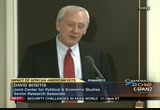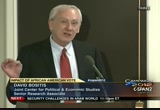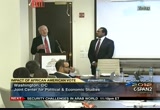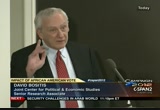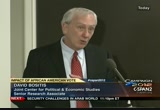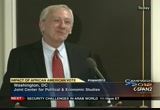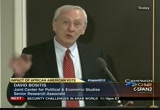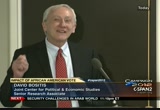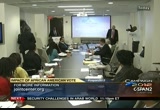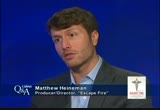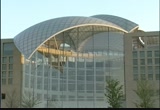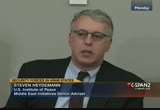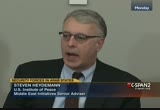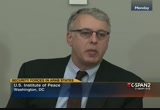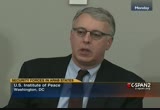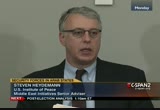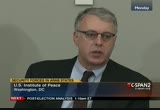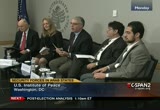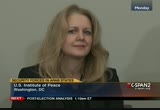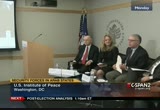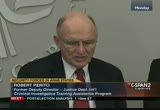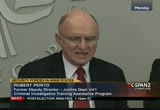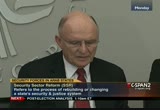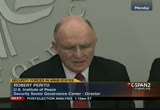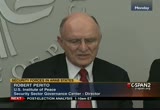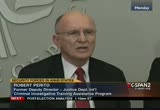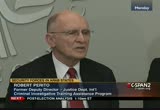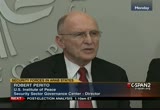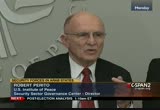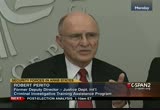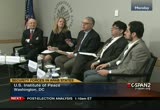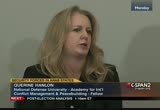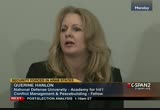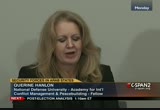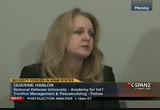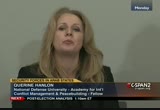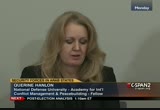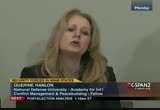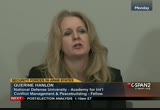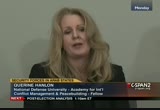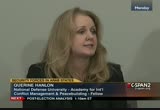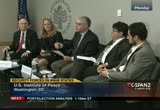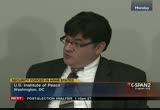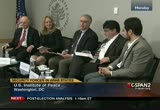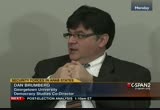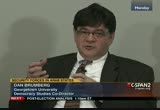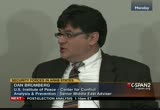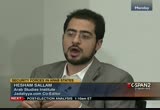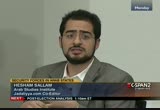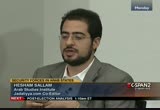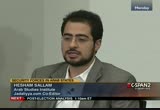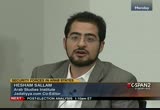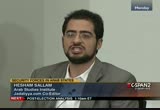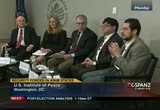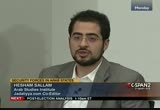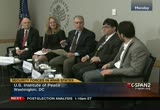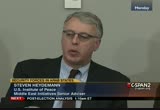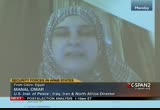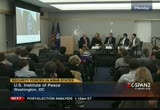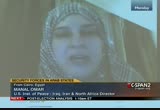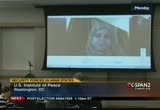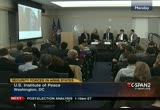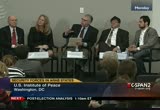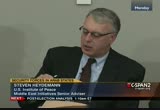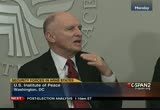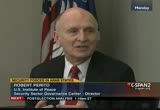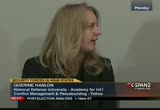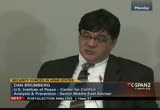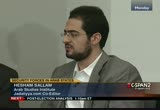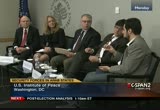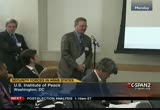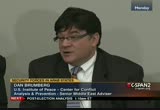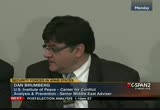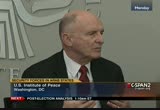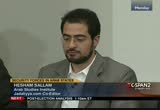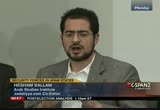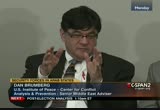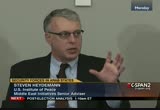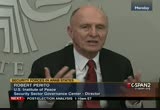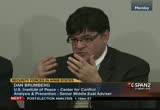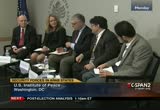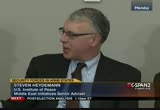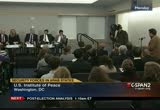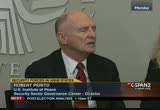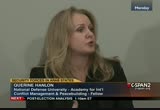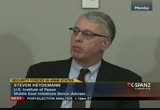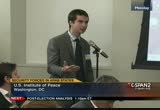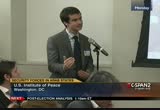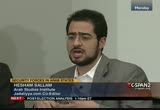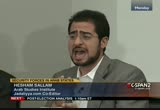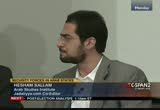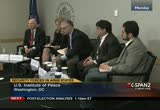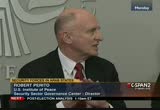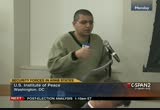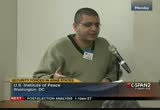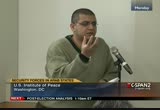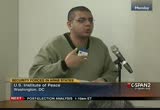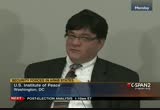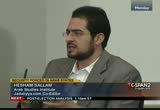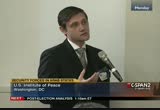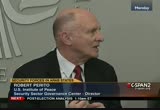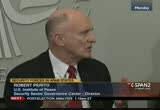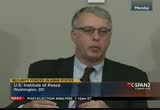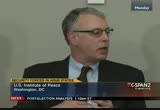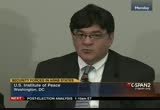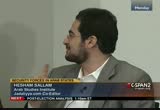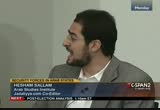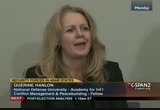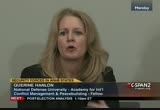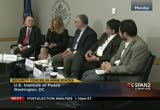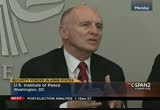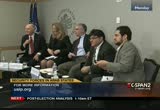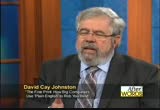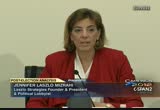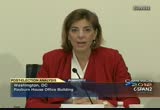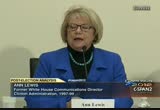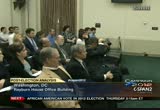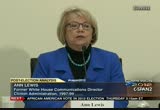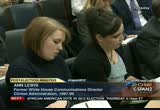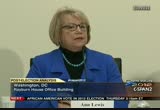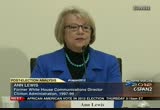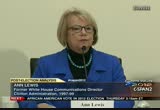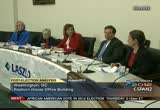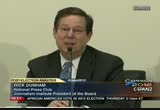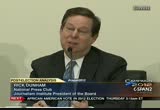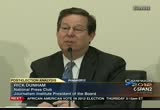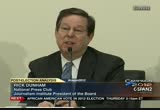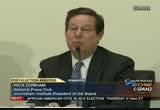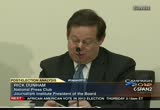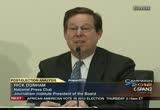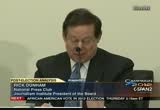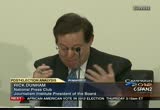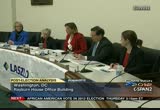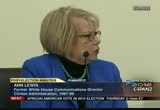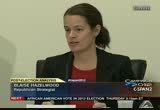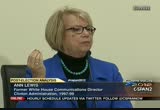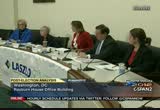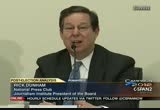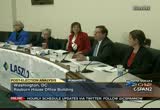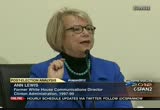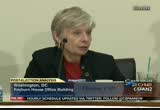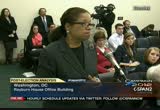tv Capital News Today CSPAN November 7, 2012 11:00pm-2:00am EST
11:00 pm
11:01 pm
heartbeat. based in the person in this country have friends and family that number about 50. so if you are a slash and burn person, that's her style. you're not going to go over well with latinos. so african-americans and latinos have been pushed together. posted you look at it in class terms, african-americans in large of african-americans and latinos are working class and have similar interests in terms of government. >> any additional questions? yes, sir. >> a few minutes ago you were talking about voter turnout during midterms. i know you said you didn't know like how we could get more young minorities out to vote, but how would that change politics if they did come to vote at the state level and also the national level?
11:02 pm
>> you see, when i look forward -- in getting old now, so i don't necessarily see myself there, but when i look forward say 10 to 15 years, as i mentioned before, every four years the country's two percentage point more minority. and especially if the republican party does not adapt, what's going to happen is over the course of the next 10 to 12 years, the presidency and for that matter, a lot of senate seat will be out of reach for the republicans. i mean, if they just feel to white voters, remember, there were always be some white voters who will support the same positions as african-americans and hispanics. but there will come a time if the republicans don't change but they'll be sort of factored out
11:03 pm
of national politics. but on the other hand, a lot of what takes place in politics, in terms of day to day lives is determined by state and local government. as i mentioned in terms of the south, local government has little influence. local government has to get commission from the state legislators to do anything. fairfax county, where i live want to raise taxes on gasoline to pay for road. it's not your call. that's our call. and that is true and all of a sudden stayed. so in terms of influencing policy at that level, the only way is by capturing those bodies. now, the spanish population i mentioned his median age 25 years they will start to age and start to have more involvement gives people usually become more
11:04 pm
involved in politics at the gilder. we'll have more involvement, but if they don't participate in the off year elections, the impact of the demographic changes i was going to be pushed a little bit further down the road and it would necessarily need to be. it could be right now or could be two years from now or four years from now. it's always been pushed a little bit further because of the lack of participation in off year elections. >> i don't see any additional hands. >> i'm wondering if you have any thoughts on the flood of money into the campaigns this year and where will the billionaires take your dollars because the super pac impact hasn't been quite what they expected?
11:05 pm
>> i saw somebody making a snide remark on the website a couple days ago about all the interested in what karl rove tells his donors after the election is over, after collecting all of that money. what is it that we've gotten? clearly there are two aspects of that. first of all, believe me when the final numbers are in, president obama and his sidekick not unilaterally define. so this is not a case where the billionaires -- the billionaires with a lot money, did a lot of things. obama and his people were very strategic in their use of their resources. and they had a lot. obama raised about a billion dollars. they were very strategic. obama's campaign can buy a television advertisement at the
11:06 pm
lowest rate possible, whereas the television stations, local television stations that are selling that want to make as much money as possible and they don't have to offer low rate to the super pacs. they can charge the super pac as much as the market will bear and in fact because of the saturation, and they in fact did say that many were paying 10 or 15 times more for 30 seconds in the obama campaign was. so i don't want to say that -- it would be satisfying to say money didn't have any effect, so despite the billions that report and the people trying to manipulate elections or even worse, another aspect of the citizens united campaign was an employer received both the sample ballot to his workers
11:07 pm
paychecks. so they would get an idea of how you wanted them to vote. there were a lot of employers who did that. but romney encouraged employers to do that. in terms of citizens united, first of all, going all the way back to huxley versus valeo, i will never agree with the proposition that money is speech. speech is speech. it's like what matt romney said. corporations are people. no, corporations are corporations in speech is speech. money is not speech and money is intended as a corruption of the political process. >> let's give a hand to david bositis. [applause] we thank you again for coming out to the presentation. we will continue to analyze the election and i encourage you to
11:08 pm
11:09 pm
>> i need some help over here. >> did he try to get up without anybody knowing? >> aegis rolled himself up. >> he was issued 20 minutes. -- [inaudible] >> that is ridiculous. he could stop reading if you took too much narcotics. we're going to be doing cpr on a patient. >> were sergeant robert gates today? >> we ended up following him after this plane ride for many months that they had and he ended up entering himself into an innovative program at walter reid, what they ended up using acupuncture, using meditation,
11:10 pm
using other techniques to wean him off of all the drugs that he was on and through this program he was able to walk out of walter reid on his own two feet. so i really commend the military for two things. for one, allowing us to tell the story, both the good and the bad, but for recognizing this problem, by recognizing there is this problem of overmedication and they are looking for outside the box ideas on how to fix it. i mean, that's sort of the whole thesis of the film, the metaphor of escape fire is the status quo isn't working and we need to start looking for outside the box ideas. >> now, a discussion on the state of security forces and arab states in north africa,
11:11 pm
including libya, tunisia and egypt. the u.s. institute of peace post this to our discussion. >> good morning, everyone. i am steven heydemann, middle east initiative at the u.s. institute of peace and we are delighted to see you all here at today's session on security sector reform in the arab world. i think some of those who rsvp may have been scared away by the false rumor that you would be subjected to a political polling experience following the panel. that's not the case that you don't need to worry about that. were very pleased to have you out here with this morning. i would like to stress that our topic this morning i think is both particularly important, but also especially urgent.
11:12 pm
i don't think that it is an exaggeration to say that what happens with the security sectors in the arab world over the coming year or so, and by security service, i mean the police, the armed forces and most of all of course the very substantial intelligence apparatus is that exist in every arab country, that what happens with those sectors of the bureaucracy in the arab world will let her sleep determined the fate of the transition that began almost two years ago in tunisia, and egypt and only slightly more than a year and a half ago in libya. if it turns out to be possible to move the security sectors in
11:13 pm
the direction of norms are part system procedures that are consistent with democratic governments, and then i think that the possibilities for the success of those transitions will have to be seen as largely favorable. on the other hand, a security sectors in the arab world turn out to be resistant to reform, if it turns out to be more challenging than we might have anticipated, to move them in directions consistent with democratic governance, then i think the probability that those will not succeed or that they'll produce outcomes that are likely to fall quite short of the expert keeshan of those who initiated and participated in
11:14 pm
these monumental events that have occurred in the arab world over the past year based on demands for justice, for dignity, for accountability in the relationship between citizens and the state will probably not be realized, that we will find that the outcomes of these transitions produce sound thing far short of the democracies that we hope will emerge and generate instead something that might fall in the category of a hate regime in which some elements of democracy coexist with continued evidence of undemocratic or even authoritarian presence. unfortunately there have been quite a few signs that are troubling with respect to the direction of change in the area
11:15 pm
of security sector reform in the arab world. we've seen most recently in libya, which will be discussing this morning clashes between militias determined to maintain their authorities in shaping the trajectory of the libyan transition. we've seen in egypt resistance to reform on the part of the security apparatus and the military. we've seen similar kinds of pensions in tunisia. so there's a number of troubling indicators that lead us to question the potential for reform of the security sector and with the longer-term fate of these transitions is likely to be. however, now that we have almost two years since the start of the mass uprising across the middle east, in the cases of egypt and
11:16 pm
tunisia of the scum a slightly time and libya, we find ourselves at an especially appropriate moment for taking stock of progress in the area of security to reform, of assessing where we see indicators of positive change, where we see continuing obstacles to moving security sectors in more democratic directions and identifying what we imagine might be possible for local actors in the international community alike to do to support further progress in the area security to reform and what the particular strategies might be for advancing those projects in the three countries that we will be discussing on the panel
11:17 pm
today. we are especially fortunate to have with us for this discussion a terrific group of specialists, all of whom have said if you can experience the field, all of whom have been focusing on issues of security sector reform, even before the arab uprising he can, but have been able to bring their significant expertise in this area to their work in egypt, libya and tunisia. what we will do from here is ask each of our speakers and i'll introduce them all now, to take 10 to 12 minutes to provide you with some opening comments about the topic listed in the agenda for that meeting. we will then open up the conversation to you, to the audience, to explore a further set of questions and concerns
11:18 pm
you might have about where security sector reform in the arab world is headed. so ken, welcome. we will begin in the order and follow the order outlined in the agenda for today. our first speaker will be robert perito. bob is the director for the institute innovation and security to reform and is a specialist in this field with many, many years of involvement and work on security to reform, not only in the arab world, but internationally. they'll be discussing what the security reforms to establish a baseline for us that we can build on in further presentations. he'll be followed by querine hanlon, senior fellow at the conflict management in peacebuilding here at u.s.a. p., who will be focusing on army and the police in tunisia.
11:19 pm
daniel brumberg, conflict management and hesham sallam, who works at one of the most innovative and provocative websites on the arab world and in particular its work on egypt will be joining in presenting on the deep state and egypt. our final speaker joining us from oman is manal omar, the director of the institute's programs on iran, iraq and north africa and who has been perhaps the most active senior staff person involved in work on libya and i spent enormous amounts of time in the ground on libya and will be addressing the topic of militias versus seton libya, a topic i've can occur both
11:20 pm
consider and set the moment. so with that, let's get started. bob, the floor is yours. >> thank you are a much steve. i direct the center at the u.s.a. p. for those of u.s. state departments, i'm the functional person under the scope of geographic experts. this is a good project for ssi because popular discontent with the security sec recent security forces was the precipitating cause of the revolutions we all now called the arab springs. security sec is in the nation's very visible, physical and often dangerous manifestation of the dial of fundamental rights and human freedoms in these countries. the aftermath of the revolution, reform of the security sector as an essential requirement for progress towards democracy. unless reform is achieved from a path to democracy is lost in
11:21 pm
these countries. security is a primary concern of the people and its leaders. in each of these countries, reform of the security sector is required to get the security you security is the basic requirement for political reconciliation and economic development. while there are common features about the security sector across the board in the middle east and north africa, there are also extreme diversities. we'll need to look at three countries that were going to be talking about this morning. tunisia, egypt and libya to see this. tunisia and egypt have very strong, mature institutions. in libya come or many of us were just recently, moammar gadhafi systematically dismantled the security institutions and of those institutions must be rebuilt from the ground up. reforming the security sector will be a determining factor in
11:22 pm
the success of the arab spring and the international community, including the united states has an important role to play. says steve suggested, we need a starting point for this discussion, so let's begin with a definition of a concept that has eluded definition most often in conversation. that is, what a security reform? it is a complex task at transforming the institutions and operational forces to safeguard the state and its citizens into professional come in fact even legitimate actors accountable. ssr can be an instrument for conflict prevention. they can be an instrument for conflict management and in the conflict stage can be away of joining things together and moving forward. ssr theoretically must be approached in a holistic manner within a framework of democratic transformation and linked to
11:23 pm
broad principles like respect of human rights and fundamental freedoms in the rule of law. it must be undertaken in connection with another reform process and that is reform the judiciary. judicial share, in the two shannon most notable. in these two processes go forward, are mutually reinforcing. ssr and holds more than just simply retraining the requesting operational forces. it also involves retraining, reorganizing, modernizing and professionalizing the institutions that oversee those forces most often the ministries of defense and interior. but it also involves modernizing and professionalizing the executive, parliament responsible for fighting policy oversight, budget review and
11:24 pm
enforcement within the security sector. ssr is a highly political process. often in the united states we forget this. we tend to look at ssr is a technical matter. all we have to do is teach the police the right way to put on handcuffs and then everything will be fine. i say this as the international drug or the foreign police training at the international department of justice. it is a political process in every step we take informs that process. ssr empowers elements of society disempowers others. it creates winners and it creates losers and often ssr may create more conflict than it resolves. as a consequence, the first principle of ssr is obtained local buy-in because the consent and guidance of local authority
11:25 pm
is essential process to achieve -- be achieved. the second principle, which derives from the first is the incorporation of the principles of good governance in the security sector. this is something, which is also often overlooked. this is not just a matter of the right gunsight for the tank. i say this because when i read dod one time on this, somebody raised their hand and said we have three issues here. the nickname for three different type of gun sights in this country. they said the world we choose will decide everything. it's not bad at all. but it really is is the security institutions within these countries have to be seen by the public as legitimate, transparent and accountable to civilian authority to establish the democratic means. establishing civilian oversight is not going to be easy. in regional state, there is no tradition of civilian involvement in the security sec
11:26 pm
per. no cadre of civilian experts ready to snap the relevant offices and committees and executive and often no legal basis for circumventing official security and exerting effect of control. now, ssr is a relatively new concept which involves strategies that are long-term. as a result, donor governments and clicking around them responsible for some of these programs in the task has been to retrieve very quickly to what we do best which is trained equip and equipped security systems. these approaches quickly put this on the ground, but often they do not redo it with little regard for oversight management and sustainability. in approaching ssr in the middle east and north africa, it is essential the international community does not rush in with quick fixes as we've done often in the past because one of the
11:27 pm
basic principles of security sec to reform is do no harm. north africa abuse of the security services abuse by security services was the proximate cause of the uprising. remember in december 17, 2011 the tunisian street vendor in a small town immolated himself after being humiliated, slapped by a female police officer. this act triggered the wave of protest that became the arab spring that toppled the ban on the regime. the security apparatus in regional states a structure to protect the regime from his people. the institutions of choice for repression where the police, security services and the security ministries. there is often a complex and overlapping network of agencies with legions of informants, deep penetration and major institutions of society and at the bottom a large and turkish police force.
11:28 pm
there's three issues i want to call to your attention from ssr mmi will close spirit is at the folly that often get overlooked beyond military and police company to think about the intelligence services. in each country intelligence services were domestically focused. they were involved in the minutia of life. these institutions have to be reformed. they have to be vetted in return and replace and focused externally. at the same time, the responsibility for internal security can be transferred to the interior ministry and the police. the next is transitional justice. dealing with crimes committed by services during the previous regime is a major requirement for successful ssr. without a resolution of popular grievances come without a feeling a part of the society that justice has been achieved, you're not going to get progress. now, the problem with this is that some members of the security services have to be
11:29 pm
punished and we have to move on. but the security services have to be trained to shoot into new order for there to be any chance of maintaining and moving forward. and so finally -- >> you have two minutes. >> at two minutes. >> that's the nicest sound so speaker can finish, not get off. ssr is a comprehensive government reproach on behalf of international donors and recipient governments. when most people hear that, they think that's impossible. were never going to achieve that. remember going to get her comprehensive government approach. and so, consequently those of us who advocate ssr have any suggestions on that snatching a comprehensive understanding of the security sector with the problem-solving approach that responds to specific requests
11:30 pm
for assistance from the host government. so i understand, think locally, act locally. understand the totality of what you're dealing with, but go within a point you can make a difference. the international community come including the united states has long-term relationships of the countries in the region. it's time to expand relationships beyond the narrow interests like combating terrorism that we focus on before an established relationships based on common values and democratic aspirations. creating democratic governance, including the security sector was the goal of the activists who are industry a year and a half ago. that has been the goal proclaimed by the transitional governments and newly elected governments in the region. international support, perhaps he can succeed. >> thank you very much. that is a fabulous overview of
11:31 pm
just how complicated it is to make this transition from a context in which the state fair principal source of insecurity to their citizens to a context in which the states are protect the men defend the right of citizens. it is an encompassing, inclusive, very demanding shift in the us a very good handle on the scope of changes that transition involves. thank you. >> thank you very much. i will talk about the challenges focusing particular on the police and less on the military for the simple reason the military of the biggest challenge in tunisia. thank you for that framework or i will try and take the case in tunisia and fit into some of the overall points that you made. until the attacks on the u.s. embassy in september. if there's one place in the arab
11:32 pm
spring, and north africa up front that was the place that is going to succeed, it was tunisia. tunisia was widely believed to be the place successfully transition from authoritarian to democratic rule. there is great cause for optimism. the military were lauded as heroes for their refusal to fire on the demonstrators during the demonstrations that brought down the ban on the government. the minister of defense and civilian, armed forces embraceable and control the military and the tunisian armed forces do not have a stake in the the internal security services there was some cause for hope. the only transition government authorized a study that produced a white paper identified intelligence and police as the two issues that really needed to be addressed in the security sec reform plan and actually put steps in place to achieve those things. particularly important, something that i don't think it's enough attention is the peaceful transition of government in tunisia.
11:33 pm
your three early transition governments, election held in october 2011 that brought modern islamic party to power. form a coalition to secular powers to form is called the trigger. even after the election, as realities of dismantling then all the state become and parent, there is cause for optimism. constituent assembly or legislature begins drafting a constitution for tunisia. they adopt fusty government to process which gives a degree of transparency that was unknown in tunisia. the militarily gradually returns to the barracks and particularly in urban centers take over the internal security function. and yes, their attention and isolated incidents of violence. but on the whole, nothing to cause serious alarms are tenacious transition is in danger of being derailed. then we had attacks on the end
11:34 pm
to see an escalation of violence incident that appeared to have been on a daily basis in tunisia. this has changed the perception that tenacious transition is progressing successfully. the growing violence in tunisia very publicly and very dramatically exposed serious structural and capacity gaps in the security sector. it may seem somewhat fantastic to make the argument the security services of the former police fatally tunisia could not prevent attack on the u.s. embassy or smaller scale incident is seen through a tunisia. when the regime fell, their estimates of some 200,000 internal security officers and that was quickly proved to be hollow. in fact commit the real number is around 60,010,000 of those were recent hires in the election that brought enough of government. it also. security forces were overworked, that working conditions were quite dismal and the police have
11:35 pm
formed two syndicates for unions to demand improvement of conditions. the police have also stage. large demonstrations, protesting the lack of pay, poor working conditions and are interestingly surprisingly, better protections for the police. the police in tunisia are free to facilitate internal security functions. they fear they will be targeted by the population from which sees the police is the most visible element of the old pen all the regime. they fear they will lose their job and they will be targeted for activities under the regime. as the military returns to the barracks, the spheres have not been addressed by the government and this leaves the security services fully exposed an unprepared for their bull in a democratic tunisia. but as several? practices are discarded, what replaces them? this has not yet been defined.
11:36 pm
one of the challenges in a particular import on his receipt when are the police authorized to use force? we note the apparent lack of competence to handle the escalating violence was not the result of purchase to remove the most competent or the most experienced commanders and officers in the internal security service. in fact, been always mli is largely intact. we know most of engagement, standard operating procedures, recruitment of internal services remains unchanged. efforts by the minister of interior, a member of jakarta and a prisoner to the management has been stymied. and when public casey tried to fire the commander of the equivalent of the software says and forces deployed throughout tunisia were forced to reassign him within the ministry.
11:37 pm
overall, the mo i is black box, organizational charts classified. but all on forces, salaries, organizational structure array of the ministry itself or security forces. despite an apparent commitment by two nations for the democratically elected government, very little if anything has been accomplished in this past year. this is particularly troubling given that one of the central issues that prompted the demonstrations that brought down the regime was the impunity of the internal security forces. so why has the government, particularly its key leaders, many of whom suffered at the regime firsthand has not made reform of the mo i am policing priority. i think there's two broad ways we can answer the question. the first is related to the absence of the legal framework. performing the security sector is an enormous task and one that
11:38 pm
is very difficult if not impossible to accomplish in just a year. it's even more difficult to do so in any meaningful way if you don't have a new legal framework, which should be established in tunisia's constitution still being drafted. the government is a caretaker government. it has a mandate to a while the new constitution is drafted. it does not have necessarily mandate to implement reform. without a new constitution, any reforms undertaken have to be done based on assumptions about what the new legal framework is going to be rather than the actual knowledge of what it is. the tunisian authorities had this comment requested to help us so the gaps by providing equipment and they been frustrated because little if anything has been provided great many donor countries, particularly european have been hesitant to providing equipment or training without new authorities in new oversight measures. the reform of the security
11:39 pm
sector is also an enormous task because it will above address and not just the lack of for lack of training and appropriate skills are appropriate accountability, but the task more broadly as to redefine the role of the security forces in a new tunisia and reorient the institutional security, particularly in the mli. if they exist to protect the regime as was the case under ben ali or several to protect population in the government? the second explanation is a political one. as bob reminded us, taylor said political process and then assert nature in tunisia. the real political battle in tunisia today is not about addressing the impunity but then all the security forces. it's more fundamentally renegotiating tunisia social contract. what is the role and purpose of the government? what is the force of legitimacy and wet and turned on the right and responsibility to tunisia?
11:40 pm
we been fighting a difficult battle. there is a fundamental political battle right now in tunisia among islamists, both moderate and selassie and between islamists and secularists and under. they have been happy with an approach to the progress of reform in the security sector and more broadly with the constitution drafting process as well. it appears that the embassy burning has been a wake-up call, but his international reputation and relationship with the west has been damaged. tunisia depends on tourism trade. unemployment has continued to grow in tourism will not recover if they cannot address security problems. for this to happen, the constitution drafting process has to be completed to provide the framework in which ssr can take place. meanwhile, the government is to build a consensus within the security ministry with the coalition across party lines and among the public more broadly
11:41 pm
the ssr is a priority. they begin with the mli and the police. the police have to have a stake in the new tunisia. they will need new guidance and training about what their bowlers and how they can exercise their vote. the government is to publicly commit, engage the population and manage expectations. without such commitment, little progress can be made in tunisia's transition may well be in danger. >> thank you. there's also some particularly important lessons in this presentation because it highlights even though security sector reform as a process contains a large number of generic elements of this sort that bob mentioned, that it would be inappropriate to imagine that it's possible to implement programs on the basis of a one-size-fits-all time late. the army is not the principal
11:42 pm
focus in tunisia. it's the police and ministry of interior. but we also i think had some confirmation of his that is critical to address the sources of resistance to security sector reform among the key participants in the process. the police have concerns. unless those are addressed, it's difficult to imagine progress. finally, the relationship between ssr and broader transition in how the integration of the suffered, or friction among them a fact. very important observations to have on the table. so thank you very much. daniel and hashem. >> i'm going to reap the lion share of the presentation. -- before this meeting or so. i want to recognize my two colleagues are not open my
11:43 pm
colleagues, by teachers because we went to tunisia together in the subject -- to your right, steve. and i once had an expert or somebody from out of town. in many respects i learned a lot about the subject each other with my colleagues, but helping write in their paper in our paper as well. i'm speaking from the dead of a comparative basis jumped into the subject, kind of baptism by fire. i'm going to share a few points here for purposes of full disclosure that has changed my life is not only a coeditor, but also a phd student at georgetown university. two of his advisers are sitting on the panel at this moment. it's a tribute that is not only statement that in many respects a colleague associated with usip
11:44 pm
for about four years on many projects. we were working on these problems long before of course the arab spring erupted, so i just wanted to point this out. life is so difficult to advance security sector reform? it seems to be two key issues. if you compare a base latin america you had extractions, you agreed to pay up the military, provide them perks as long as corporate interests could be asked to step aside and allow civilians to return to government. in the middle east the security sector is aligned with a great deal of indigenous institutional and bureaucratic and economic interests. yet the problem of deep state and therefore getting the military to extract themselves from their involvement is not just a matter of a simple payoff. it's much deeper interest in a
11:45 pm
web of entries linking the military to the bureaucracy and economic actors, international or person that makes the whole process much more complicated. it's huge resistance. the other is to emphasize is that in the arab world, in the middle east and more generally, the struggle to create a social contract is also a struggle over issues of identity and how in what ways we restructure the relationship between mosque and state is a critical issue. to the extent struggles between islamists and secularists magnify perceptions are not only can you let terry, but the interest attached to the military, that the military's departure from politics will pull away the protections provided by the military to those groups were particularly in tunisia, the ominous realities many secular groups look to the security apparatus to protect and to some extent think the same thing about liberals and the judge, but they
11:46 pm
look to the military. the protection is threatened. there's a dynamic dynamic really magnifies the capacity of the military to exploit the transition in order to signal that they're going to pay a high cost. it doesn't seem at all coincidental the case that tunisia is to the police several hours to get to that school, which was nearly burned down. i think the military and security apparatus in tunisia is signaling its own discontent with the situation. so we have tremendous kinds of constraints. tunisia did seem like a very positive case in the beginning. the military steps aside and the contrast was the arbiter of conflict between different groups. in reality the two groups are left to negotiate among themselves and that and that looks like a process succeeding. but now we have a tremendous
11:47 pm
polarization about the influences internation now a real polarization between the two is magnified with the capacity of the security apparatus to manipulate the situation to the advantage and that's an additional impediment. >> well, thank you very much. i should start off by thanking the panel and four speaking to you today. i should also thank steven den further overly generous. it's a pleasure to be back at the institute and the presenting alongside the distinguished group of people, including two by dissertations. it's great to be here. so as you all know, the topic of security to reform in egypt is very timely right now, particularly in light of the violence in sinai.
11:48 pm
we are also very quickly approaching the first anniversary of the battle is of last year when police brutality against the protesters led to the eruption of daylong clashes that left over for the debt and a dozen injured. as dan blumberg and i write at the u.s. institute of peace, from insecurities that are institutions that subject in the oversight and accountability has been at the forefront of the type system is the animated the resolution in the popular mobilization that he swept the country ever since. yet, never the last, with two years passing since the 18 days, 2011 uprising, unfortunately we
11:49 pm
find advancing the security reform in egypt remains as many -- as recent reports by international and egyptian human rights organizations have shown the use of practices have continued and there has been seriousness on the part of the egyptian authorities to engage with civil society initiatives and proposals to restructure the system and reinvent the framework that governs the structure. on the other hand, the military -- the military sector, effectively a lock box that had been touched by this resolution, even though president lucy, in august dismissed the longest-serving leaders inside the military establishment is supposedly now and egypt, quote, unquote, a system in which civilians control the military. yet nonetheless, there are no
11:50 pm
knows the military is going to give up his long-standing anti-democratic political and economic privileges and there is no clear signal that it's going to subject itself to democratic standards of accountability and transparency. for example, a few days ago the head of the central accountability agency in egypt announced he is still unable to this day to add it and economic enterprises owned by the military embarkation civilian production of goods and services. and also the deeper concerns, the current draft of the constitution compared by the assembly contains language that is not dissimilar to what the military sponsored as a document. specifically an article that cites the military act to defend
11:51 pm
budget beyond the reach of public accountability by parliamentary oversight accountability as well. after all base, still lack a credible and widely accepted transitional remark that could effectively bring to justice current upon the security officials of wrongdoings, particularly protesters before and since the outbreak here do so when stewart is fair to say there's a long road ahead in bringing the issued security status meant to type it changed the lives of the expectations of the gene are 25 resolution. where do we go from there? i think there's no question there's a lot of uncertainty ahead and a lot of political battles that are yet to be resolved such as the writing of the new constitution in the parliament expected to be elected are scheduled to be elected after some constitution is ratified.
11:52 pm
yet that being said, setting aside various uncertainties, one thing is for sure, which is the fact that the boundaries and prospects for security sector reform in a jab will in no small part depend on the type of leadership president lucy is going to admit in the coming months. right now from what we see, there's two unaccountable centers of power that are exerting undue influence over the executive assistants. the entrenched bureaucratic power, egyptian or what is commonly known and that encompasses the security there, but not exclusively. and of course the influence and sway of the so-called deep state is reflected by the fact that the sponsored government
11:53 pm
confessed of primarily long time, including the prime minister himself and another center of power is the euro, or seems to have a variety of advisers and aides with not only strong links and loyalty, but strong links and loyalty particular individuals inside the muslim in order to steer the president be in various decision towards a favorable direction. all of that of course from behind. so the question of course is that remains to be seen whether president vc will choose to break through the powerful unaccountable special-interest and uphold the principle of popular sovereignty on the
11:54 pm
revolution demand for real transformative changes in the institutions particularly the effort. i mean, what i'm saying here is he needs to decide, you know, what our the military domestic security establishment the reach of the new security sector reform strategy was the guidance. the red line, or is the red line that people come and egyptian people as many partisans of the january 25 resolution since the out right at the 18 day uprising. this is essentially the critical objection and within that context, there's a number of structures important here. the first one done alluded it's
11:55 pm
very difficult to build coalitions around institutional reform agenda. in the presence of strunk's polarization against islamist in egypt today and the battles over the constitutions. we also, secondly of course the increase in national security challenges, such as the cyanide does i think it's very likely to increase its way in influence to the elected leaders, which is to make the drop of elected civilian leaders and reform difficult. and the economy is going to be critical. i can't emphasize the point enough because one day we point out in the report is the undue influence the ministry of interior has accumulated during mubarak's last decade is in
11:56 pm
large part a to the need for a strong apparatus that could contain socioeconomic grievances and protest movements that were mobilizing around the grievances by decades of pursuing unsound and nontransparent economic civilization. so if the sponsored government shoes the same line of policies and wants to, if you look on the but mubarak has started in egypt, i think i will only deepen his dependency of the egyptian states on a strong apparatus that could contain unfulfilled demands for social and economic crisis. i think we need to think about it critically and lighted the negotiations between the national monetary fund and egyptian government.
11:57 pm
>> i'm going to stop you. i hope i didn't go over. >> is fabulous and laying out a detailed summary of the state of play at these issues and doing it in a way that it can highlight a one of the core issues on the price is a security reform and gauges. as bob mentioned comes security sector reform is a political process that produces winners and losers, but the forces do not exist in balance. there is an asymmetry that affects the dynamics of security sector reform. in egypt, the potential winners are fried to, not well-organized , underresourced, generally do not commend institutional resources that those who would be the losers, perceived losers of security sector reforms and shapes the relationships between the two in important ways that i hope we can unpack a little further in
11:58 pm
the question-and-answer session. we will now turn to the critical case of libya, which is very much in the headlines recently and invite manal omar to give us give him the state and libya. the screen is yours. >> thank you. thank you very much, steve. what i thought i would do is go over the recent activities rather than going terms of the varsity show changes, particularly because the libyan government has recently formed a new government parliament. one of the crucial issues to highlight is unlike egypt or tunisia, where is relatively peaceful resolution, libya was one that involved international intervention and particularly military intervention through nato. they come to a question of what is the responsibility afterwards a year and a half later with the security situation on the ground
11:59 pm
in the international role in securing and stabilizing the country. more importantly, was sent to an almost in parallel when we talk about arming the rebels and what happens later if the rebellion is successful in gadhafi does fall, what are you going to do with all the arms in the country? of course the formation of the national transitional council reassured people there'd be some element of control. in reality there was control for a long time as negotiations go on and the government permission ticket to account the role of the militia of which is one of the implications that outlook can expand further. before the fall of gadhafi there was what happened with all the arms entering the country. as i mentioned, there's many worrying trends. some of the recent activities has been the biggest fear for libyans on the ground in terms of what happens if the government can't rein in the militia and the overall question of security.
12:00 am
12:01 am
militia that is emerging as the central power, but there seems to be many. even the supreme security committee, so you are seeing more intron militia fighting between the motion and the state, but one of the most important activities along with the situation in benghazi. but going back to that issue ration -- the situation. while i was there recently and libya while the big questions that was asked was that was not necessarily just the state responding to a law that was issued by the general national assembly, as much as the response was folded and. so there was a question. will the state be deciding all militia or is there some standards or criteria for good melissa cooperating and militia that is not. traveled to tripoli, and i had the opportunity to talk with, the company at that the issues are in a stronger extent in other areas.
12:02 am
since there were seen to be cooperating with the aegean sea, there were being sidelined or marginalized or not highlighted as much as the situation. so those of a larger activities. but if you look at more mundane, even day-to-day cases of what you're seeing is a lot of communities are turning to mush for protection. the state in the aegean sea can and that police base is slowly eroding, but even issues which will become a larger of conflict in libya by property issues, you're seeing the militia playing in feeding into that. so the issue of property continues to be one of the main issues. with the management of expectations, when they need them to have property issues be quickly resolved. what tends to happen, where people like tight end, they are resolved because of strength and color, the motion is able to take people outside the property and then reclaim them. it is not uncommon to find guerrillas or buildings that are spray-painted with a militia
12:03 am
named. laying claim to that building. so we see that this issue will also lead to long-term issues that will have to be resolved, in addition to just the securities sector. but what i wanted to do was focus of the implications, one of which i already mentioned which is that one of the primary reasons, when discussions with libyans on the ground why they're leaving is because of the militia and the security situation. so many are looking to the aegean sea, and the term often used is a strong or iron fist to show control. at the same time, you know, you're even seeing that gmc cannot only respond to the situation, but their own security. not uncommon for militia to storm that gmc. recent there was discussion if the aegean sea should move its primary location away from tripoli, keeping in mind, benghazi is not safe either. so they're not even able to provide their own protection, let alone expand protection to
12:04 am
the country. but the other implication that is important. there was accusations that the government's being biased, depending on who supports the militia, and the best example of that was the situation. going back to the idea of using an iron fist, the implication is quite dangerous and the fact that people have given up on due process were given up on building institutions or the long-term need of change. when people are calling for the iron fist or not necessarily concerns, you know, that means, the ins that justify the means, then you can create the same system that led to the revolution in the first place. and i think that is a growing concern that some people, particularly international organizations and human rights organizations have on the ground because you're seeing a large acceptance for stepping rule of law or unnecessary attention or even no due process, manager of security and stabilization, but
12:05 am
the question what happens down the line. you know, more and more you can hear libyan human rights organizations asking the question, have we exchanged one form of government or one form of system that led to human rights abuse for another one, particularly with amnesty international which called the militia, have of control. at the same time, it really calls into question one of the lessons learned from, you know, libya. one of the main issues is the way the system was set up, particularly the aegean sea, and even now with the ministerial which awards those parts most active in the revolution, in many ways rewarding the malicious leaders. so you hold it within the system, the informal melissa system, and now to try and separate them, i think, is going to be a particular challenge. it is an important lesson learned looking particularly at the feeling in the region, the arabs during is not quite over and that there are so many
12:06 am
countries that may follow. i think it is worth pausing and learning carefully, issues that may be able to be taken for. finally, one of the biggest challenges, particularly in terms of lessons learned is that , within the larger debate of militia, which everyone agrees has a large spread of support within libya in terms of disarmament and bringing the militia under control, the aegean sea is folding in other legitimate issues that are coming out. for example, a lot of the people have been asking about transitional justice or national reconciliation and feel that they are not quite ready to give up unless they're is a very clear system of protection and the way forward. i think that attacking or targeting of militia without answering those questions will only further erode the legitimacy of the gnc. it is important that we don't hit the legitimate debate because it's a pressing issue.
12:07 am
i think that that, you know, calls into mind the final issue that i would have. i think bob already mentioned the complexity of the securities sector reform, and i think it needs to be reminded that only within libya, but the engineers of community as well, and managing expectations. so much needs to be done. there is a lot of parallel tracks that must be taken. even in a best case scenario, if there was an institution that were quickly to emerge, just the fact of building trust and confidence from the community in these institutions for so long has been the reason for oppression in the country is got to take a lot of time. my concern is that in order to see results we may be putting a lot of pressure for quick short term fixes and skipping processes that would give more sustainability for a long-term solution. >> thank you very much. i think what you were able to do in linking some of these current clashes to longer term issues
12:08 am
around questions of states building and securities sector reform is exactly what we needed to avoid seeing them as somehow manifestations of tensions and conflicts that arise without any longer sense of the origins or how they fit into a broader process, and i think what you were able to do in your comments, as well, is to underscore that even though we often tend to think of state as one of the principal sources of resistance to security sector reform, there are also criticality to the success of security sector reform and it is the absence of the state that is a huge factor in producing many of these trends toward disenchantment and the doe origination a process is a political change that are so troubling for the longer term trajectory of libya, and so that is a very useful thing to have
12:09 am
on the table. again, thank you very much. thanks to the speakers who all stuck so closely. we have almost a full hour for discussion, which is really terrific. and i will be taking questions. i did 110 ask each of our speakers very briefly, it is a big question, but very, very briefly, you were fabulous in presenting us with diagnoses of issues. in one instance, you know, hesham sallam talked a little bit about strategy. but i would like to hear just a bit more along those lines and, given that diagnosis that you each presented of the cases in which you were working. just say, you know, briefly where you think the most promising opportunities might be for making progress in dealing with the kinds of issues that you have covered. and because you did the overview, bob, perhaps we will be exempted from this. >> i can start. >> go ahead, you start.
12:10 am
>> because of the theoretical discussion. one of the basis -- there are agreed steps in the ss our concept. in the first degree step is an assessment and the second is strategic planning. so it is quite appropriate that we start here. you know, we are taking a classic ssr approach to these problems. we start with the steps and go into implementation and evaluation. so that it is really critical, and what is missing is this lack of assessment and strategic planning. and it, you know, it was mentioned that while we were in tunisia we discovered a white paper for the transformation of the interior ministry, which is really in the document. it was not available. and then we some how about somebody you have a copy. but but we came back without the
12:11 am
u.s. government did not have a copy. and so the level of planning in libya there is an effort to do planning for the ministry of defense, but not for that ministry of a qa. it's fundamental. >> thank you. >> i think the greatest potential opportunities are also in that part of the securities sector that is most deeply troubled -- troubled. i think the fact that the police are afraid of operating tells us that they sense that the rules of engagement, standard operating procedures need to change, but they don't have the guidance. they don't have the protection of the ministries. they understand that security is escalating and their role is changing. i think that their -- this appears to be an interest in having those addressed the, organized, stage protests, saying, we are not afraid tough upgrade. there are issues that must be
12:12 am
addressed, so that is one area where even at the beginning of a dialogue, before the constitution, quite a bit of that work that could be done within the ministry of interior, within that it turned -- internal security part of the sector in tunisia. certainly there has been this initial assessment. it's a pretty solid assessment that is what you would largely expect to looking at a state like to uneasy with the problems are there. that government could perhaps revisit it in the context of the current situation that is developing and begin to think about how to start implementing those steps. but it is political and it is a slow process. so the problem with having to also talk to your population is, you have to manage expectations of these kinds of environments because the frustration of your population outweighs the progress, then it's difficult to be able to show that there is something that has actually been done to say that this is what we
12:13 am
have accomplished a bad thing that is the kind of thing. >> time may not be on the side. very quickly. >> well, he talked about the problem with sequencing. we mentioned in our report. the curate catch-22 and securities sector reform is you need democracy, and you need security sector reform for democracy. how to manage this paradox to let this catch-22 is a central question. in that regard you cannot achieve everything quickly, and if you go after the most entrenched forces you will be tremendous resistance. we saw that in tunisia. at one of the things i . out that think is very much true for both countries and to some extent for libya, even though we have the absence of the state, is to push the democracy process forward. in institutional and constitutional process because you cannot move and the deeper issues of securities sector reform with of creating the institutional and constitutional parameters for democracy. absent that you're not going to get everything else, and that is
12:14 am
why the growing escalation between islamists and secularists and within the islamist campus so troubling, but ultimately the issue of is something that is critical. how much influence the united states can have on the issue is a debatable question. it really is going to come down to the capacity of leaders in egypt antony's yet to put this -- puts this board and overcome this increasing polarization. >> i am just going tad to the remarks and say that in terms of technicalities and in terms of the specifics that need to be taken or, what we can figure as the domestic security establishment, there are all laid out in a study that was put together by a group of civil society leaders as well as a group of leaders from the securities sector and what was known as the national initiative to rebuild the egyptian police. and so there is a great deal of
12:15 am
debate within civil society about the exact concrete actionable steps that need to be taken in that short run and in the long run as well. some of these steps actually lend themselves to the type of changes that would require parliamentary deliberations, and so this is one issue to keep in mind. so the dialogue, ideas are out there. what is really missing, as has been mentioned, is the political will and the seriousness of egyptian leaders to engage on this issue, even if, you know, the egyptian state is now ready to adopt all of these recommendations. at the very least their needs to be some kind of ongoing dialogue on these issues. but at the same time, i just want to point out, even though the issue of political will is important, there will always be a certain set of structural factors that will limit the seriousness of the willingness
12:16 am
of the egyptian leaders to engage with this issue which once again goes back, to put it end steven heydemann terms to my problem between the social path between the state and society of the state is still not delivering on the demands of the revolution for greater social and economic rights to this social contract between the egyptian state and society not reformulated, the state of animosity between the states, between authority and certain groups in society will continue, which will deepen the need for the type of force and apparatus that is inconsistent with democratic principles and process these. >> thank you. >> you know, kind of a cliche in terms -- and that think that is what other things. positive steps are almost embedded with pitfalls. and so the aegean sea move toward transparency, which i think is a very positive step, all the questions have led to a lot, and terms of the militia
12:17 am
and in terms of sending relief rather than making, what i think probably what happened behind closed doors, a lot of agreements, people are making political statements that fuel the conflict rather than coming you know, coming down or finding solutions. another example is the price, very important. tending to shift more toward appeasement and sometimes at the cost of efficiency. so the pitfalls almost embedded in a positive step. and finally with security, i think the best example is also what we found, you saw citizens really embraced at the militia that was there, and in order to kind of, you know, a protest against violence or the action, they formed and picked up with the militia. so again, the concern of what precedent is being set at what cost, not one, they're going to have to step back and really start to weigh in how to address
12:18 am
those pitfalls imbedded. >> thank you. thank you very much. we are going to turn to you for questions. this event is being taped by c-span, which means that we need to make it possible for the media to record your questions. we have a microphone on either side of the room. what i would ask is that if you have a question up behind the microphone. i will move with full equality in democracy across. end i know you wanted to ask a question. so we will simply move. if you wouldn't mind we can adjust to it that way and proceed down the line. thank you very much. your colleague right behind you there had his hand up quite early -- early, and that like to reward that kind of enthusiasm. and identify yourself, sir.
12:19 am
>> doug brooks with the isi international security assessment association. >> i'm sorry, can you hear the question? you cannot. we have lost your voice. okay. i'm sorry. go ahead for. >> my question to all the panelists, and basically what i am interested in is how much actual influence the united states in the west has on this process of security such a reform. pushing the agenda, pushing ideas in each of the countries. how much that influence we're actually exercising, i guess. >> the question is about the extent of u.s. influence on the process of get ssr. and why don't we reverse the order. what is your sense in libya and we will do egypt, tunisia command more broadly. >> i think quite high in terms of -- >> you are fading in and out. it is a microphone issue? i don't know.
12:20 am
>> is this more clear. >> system and that is good. >> okay. i think in the case of libya the government clearly asked for assistance. that is the key issue. they're looking for technical assistance. more behind the board advice and influence in terms of experiences and lessons learned a from other countries. very important for the sovereignty of libya and particularly in terms of the -- the government making decisions, but from what we have seen, particularly with the attack -- they have been very clear that there is a need for support. -- the u.s. being supported. >> in addition, of course, libya has resources that facilitate these relationships in ways that other countries might not. egypt are really quickly, just one of the two of you. >> well, obviously we have a tremendously close and enduring relationship with the egyptian military security sector. that is a political and
12:21 am
financial relationship. there are lovers. the debate is out to exercise those levers. my own sense, my personal opinion here that the more they exercise on the basis of quiet diplomacy in the dialogue with the security sectors of cells, we can push this process forward. but at the same time, having a public discussion with the egyptian leaders for the need for the democracy process. to kind of discussions that have to be pursued at the same time and let me allude to something that shannon said before. there are import civil society groups that have less stake in this dialogue and we need to maintain our relationship. the important thing you pointed out in the report is some of these groups include elements of reformists within the security apparatus, and we need to focus on how to, sort of coming days as potential reformist and identify them increase their leverage and not make decisions which really undermine leverage.
12:22 am
those are some of the challenges >> i think that the united states has a strong relationship with egypt. particularly the ministry of defence. many of the military officers have been educated in the united states through various programs. it is also interesting that very recently something that was not the case, there is now my daughter coordination committee that is set up to coordinate the various focused efforts of international organizations of other countries that there which i think those welfare making sure that there is not under duplication of activity. so there is -- the eu has a presence. countries working in different parts of the sector. spent a lot of time doing work, and the u.s. is in days as well. >> there are. >> it is interesting that in the 90's we had this -- several
12:23 am
examples of massive united nations led intervention is where the u.n. moved and established a presence and governments in iraq in afghanistan and was u.s. invasion, but in north africa, particularly in these countries we are discussing, something new is happening. this might think, in some respects is the international community learning how to do things into for ways. certainly we are not coming back to what we have done over the last 20 years. we are going to do this into for weight. as an engine mastectomy we are learning what the processes, and if you're on the ground you can see there are a lot of things are gonna people. there's a hesitancy about this intervention in this involvement that is quite telling and was not there, you know. >> interesting. thank you. >> yes. >> identify yourself. >> deal woodward, and i would like to know how women's rights are being protected and advanced, and i would like to know if the muslim brotherhood
12:24 am
is seen as the main impediment to that and how the constitution's are including them. >> let's start, perhaps, with the most significant case, the constitutional issues in the role of the muslim brotherhood. you just come back from fieldwork in egypt. so what is your sense on that point? >> well, my sense, quite don't think you need a sense to realize that the redress of the constitution has a lot of question marks in regards to the question of what is right. the sub qualifications and there that are raising a lot of concerns, prosecution would say that women's rights are protected under the constitution as long as it is consistent. of paraphrasing, but you're welcome to look at actual -- this is a draft constitution that has not been ratified. you're welcome to look at the
12:25 am
actual test. make your own judgment. but i just want to clarify. i don't think, particularly of the question of women's rights and women's empowerment, i don't think we should faucet -- focus exclusively at this discourse. in fact, women's rights, this is not the only entitlement -- impediment, even if it is. i also question the seriousness of a lot of forces on the cost. women's rights. patriarchal. this is what some liberal and secular forces have to say, so i would not say it is necessarily an islamist problem per say. the other issue is that the economy is important because, i mean, we tend to look at the questions. women's rights, which is a very important aspect, but also the economy is important. a lot of economic issues and
12:26 am
socio-economic problems that are, you know, concealed, but fundamentally questions of clemens rights and empowerment. today we're talking about the problem of the informal sector, and a considerable portion of the egyptian population works in that sector and has no labor protection. the biggest -- the people who are hurting the most from this reality are actually women, so it is not exclusively a question of what they have to offer. ami, what is lot less have to offer on the question of women rights in what they have to say about the question of an important aspect to my but not the only one. >> also securities sector reforms, the question of women's rights. we can get into that, perhaps, but more. but less due to an easy and libya, and you may have some broader observations on this issue because you have been working on egypt and libya as well. so if you have any -- >> the issue of women's rights
12:27 am
is a very large issue. certainly to the scenes have pride in themselves, the most liberal law regarding women's rights. a exception, there was a great deal of protection for secularists and women as well. one of the issues that drive the debates about how we define this -- define the state and a new social contract, how was the role of women going to change to make and sell a great deal of the -- a great deal in the past. and sure, the provisions of the constitution. to find them in the same, which was a very fundamental shift from the way women have been defined in today's in society, certainly in the urban center. focusing on some big issues. it is an important issue, but
12:28 am
there are bigger issues of how this new state, the relationship is defined. >> i think that, you know, to deal with the issues -- >> can you lift your microphone a little bit closer? >> is it better? >> so-so. now we have lost you completely. we are not getting audio. zero. okay. we will -- we will try to recover. >> a strictly patriarchal system. >> two things. first of all, it depends on who is defining women's rights. there is not necessarily one
12:29 am
group. we have islamists with different views. i mean, the pressure from the ground up is really polarizing debate in making it much more difficult to come up with the formula whereby we can address the issue of women's rights and a whole slew of issues that will raise it to -- res the gap. that is a continuing challenge. is all this quite explicit in their rejection and in the kind of a weakened -- will we consider modern rights. >> and as we have seen, which where the police force did include a significant number of women. in cases in eastern europe, it produces a decline in participation in the workforce and perhaps the exclusion of women from some of the rules that had been occupied
12:30 am
previously. there's a whole range of dimensions in which this issue manifest itself. let's go, if we can. >> i used to be the director of peacekeeping in the state department. i just want to second the things been said by the panel and the importance of ss start. peacekeeping is temporary. the first-ever, the temporary peace, moved to try to make that peace sustainable. but i would like to ask. bob's question on the relative roles of the transitional government, the international institutions such as that you went to our regional institutions nato, you. i would really love to have the arab league more actively involved. the a u.s. and africa and of individual governments who are trying to go wind and assist the
12:31 am
transitional governments in doing that specific capacity building in the ministries and then a mocks the police, intelligence and the military mon-khmer forces. >> i think you have given us a question that occupy s. the role of all four of those critical actors and the process, perhaps we can convince corespondent, all without doing an injustice to the issues which are really very importance in determining success or failure. >> this will take a piece of that. to look at the response from the international community in the area of police training. entries / four to invite small numbers of police from countries to come to their country. in libya, for example, there are five or six different countries that now hosting police for training or that are providing
12:32 am
training, something like that, without any overall coordination is a situation where at the end of the day you get police officers coming back for training courses that are trained in totally different ways. you may have very little basis on which to talk to each other. ideas about how they should proceed in an immediate basis. and so this whole lack of an overall, overarching consensus, planning apparatus impact immediately, particularly when the have countries rushing in to try to be helpful about implications. >> it's a striking, the lack of coordination. you're on the ground. you see the number of players trying to help and there is no overarching mechanism to structure the support. this is critical because the taxes are interrelated.
12:33 am
a group of warriors, very active, trying to push the state to allow lawyers to be present during interrogation, but, of course, from the perspective of the police they got their information by torturing people. if you have lawyers present you have to have the mechanism to invest and demonstrate culpability. and training the police in the basic methodology of being police an investigation then someone is something that interval -- is interval. and there you the thing that we would identify clearly which country or agency would be a will to do that in making huge difference in terms of the process, but then again, it's not clear who's going to be involved in this process. so lots of pieces need to be done more less simultaneously. it's a major challenge. >> would you identify these as issues that cut across all of
12:34 am
the institutional levels that were asked about, international, regional, government. you know, if he were to think about this from the perspective of regional institutions to buy these the kinds of concerns that often action precedes thinking? is that characteristic across the board? >> is their regional institution here that is prepared to step forward? do we have our regional institution? i will ask that question. is there are regional institution, a nail, european union? >> well, the european union has taken it. in the number of european governments are focusing resources very heavily in support of local programs, but they operate, i think, in ways that reflect the kind of
12:35 am
approach is that you can. they have not engaged in a dramatically different way, i think, then the u.s. has in addressing these issues. >> that era -- >> i am not aware of an effective regional institution that has adopted security sector reform as a core priority. >> we have been doing a fair amount of work on this. i just released a new book. the first year since khaddafi that makes some of the points. bob knows. he was a little bit involved. a couple of small differences. we are a little more interested in seeing nato maintain a role in libya. anyway, the question that i have to make if we think about models
12:36 am
, both process and product and securities sector reform, i would be interested to hear from the panel. in the models come with any of these countries should be looking to in each of these cases on the process and the end result. >> i don't think so. every, this question comes up all the time. you know, particularly on the part of organizations like yours and yours that try to look at the international experience. my own sense of it, maybe these other approaches don't apply particularly because of the lack of resources that are available from the outside. this overarching on the part of the engine is a committee to move forward at this point. you know, we have, in the past, deploy massive resources to deal
12:37 am
with problems. there is not a willingness to do that. there just may not be. this is, i think, and i think we are a new round. so will we have done in the past may not be applicable. >> we look at other areas in eastern europe, the countries have similar challenges. when you're looking across, you're facing a very different challenges. you have a militia. building institutions. that is not the case into asean. the problem is not the military but the police. you're seeing some very different kinds of -- kinds of challenges. you will see that in each of these cases there are significant differences. finding a model that works as hard to do.
12:38 am
people like to fight the eastern european case. the problem is that the reason it does not work, there was an outside incentive in. in the eu has to really drive the political will and make the commitments to undertake. there is a us something parallel to that, certainly for a country like tunisia. what they're looking at interestingly enough, south korea, taiwan, south africa. places that have undergone similar authoritarian transitions to democratic rule, particularly with an emphasis on the police and internal security cases. >> i'm glad you mentioned those last few cases that may, in fact , although some opportunities for learning because if we have not integrated that possibility into the way this group was founded to my would have underscored just how potentially significant
12:39 am
the absence of prior model is for security sector for in the arab world because it tells us a great deal about the limited validity of what we often think about as best practice in the field, the limited validity of all we often think about in lessons learned that are portable across cases from one instance to another. if we have to approach both of those points with far more skepticism in these cases than others, then we may be riding the rulebook all over again for these cases in ways that hold out to my think, significant challenges in trying to move these processes forward on the basic of expertise and experience that they be far less relevant than might have been assumed a couple of years ago. so there is a lot to think about in this notion that we may not have modeled, and he should be aware of that.
12:40 am
>> the project on millie's democracy. asked about the problem, often a perceived sense in between reforming security sources and strengthening them and how this plays into sort of the new political actors are reviewing their own success, including electoral success. for example, in egypt, the brother had may be reluctant say and certain aspects, dealing with the military and privileges , but other areas, police cannot abuses and behavior of police, i think my impression, we would be happy to see is directed to the improved, but they're is a perception by many in the egyptian government that if you were to address these issues it of a result in short-term increase in crime and
12:41 am
instability, and they feel as though they can hear, fight crime effectively or they could adjust these kind of concerns which would be useful and long-term detrimental in the short term and they would pay heavy political price for the increase in crime, basic security that would come with this reform. a little bit about that. also, the couple of. and one of the top picks the came up was the attacks on the u.s. embassy. while those of us here, that might obviously high late in need for security sector reform, the interpretation is very different, and to some the lesson is that we need stronger security forces and the some of the changes, some of the modest changes now we might see as positive of the past year car seen by some as the cause for the weaker security forces and the cause for incidents like attacks on the embassy.
12:42 am
if you could, at i have to adjust that. >> yes. the iron fist, an average. you want to jump in on this? >> first of all, i mean to my was sort of like tab bracket that pursuing sector of the security service, more than it already is simply because there has been very little security sector reform. i don't see evidence of that. but i would like to kind of -- some of these assumptions a little bit by saying that the assumptions that you're necessarily going after, you know, leaders and said the securities sector our security sector personnel, i think it's a misconception. because if you look, for example, at the initiative, as
12:43 am
was proposed as i said earlier, by members of egyptians as a society in members of stakeholders from within the security establishment, they include a lot of measures that would strengthen the position have security service personnel. for example, some of the proposals, standards of living and wages for police personnel that include the right of the egyptians police officers to unionize, and you also have to keep in mind the options, the absence of this level of empowerment. in barring the police officer is, you know, actually contributed to this environment that is lending itself to all we have been seen in egypt lately, abusive practices by the egyptian police. for example, the fact that a lot of police officers have tap p.m.
12:44 am
the certain rank, captain contract as a secure and full-time, permanent employment status with protection. and this is one of the conditions that actually makes it much easier on the superiors and the senior members of the security establishment to basically pressure them into the you know, seeking unquestionable activities. if you don't pull the trigger that i will in your contract by the end of this year begins you are contacted basically a protected. so i would question the assumption the securities sector reform is necessarily a bad, you know, disempowering or dismantling the securities sector and never said there are a lot of masters that would strengthen the status of the
12:45 am
egyptian police. >> thank you. >> i think when we think about security sector for command this idea of reform first straight, when we talk about strengthening we're talking about weapons come up capabilities that they can get out. for example, the argument being that there was not an appropriate amount available. the police officers, the brand new hires that have come aboard. and none of the training, the rules of engagement have changed, and there were wholly unprepared. the sample was incompetent. relative lack of confidence. that, the element of fear, and if we use force will seek targeted. and so all of that together creates a situation, just not
12:46 am
prepared. but an issue of competence. are they capable? to they have the rules of engagement? to know what to authorize to have the right kind of equipment? are the protected? to they feel they have a stake. all of these things are very important. and that is where security sector reform is essential. as you are reforming and indulging in structural oversight and accountability of these institutions what has to remember that you want these to be competent. there is a job they have to do. in another state it might be the military. they have to deal to do certain things. so in the case of the police, so the accountability is oversight, but it is also a competence to deal to do the job. whether it's the government or in the case of the military. >> this is a question that comes
12:47 am
up every time. it came up in the balkans, iraq and afghanistan. if they are a trade-off between authoritative policing in democratic policing many people say, if we get to democratic policing the police will become soft and there will be more kind -- crime. in fact, that is really not the case. effective policing in general is based on consent and support of the public. and to the extent that the police bourses are brittle, anti-democratic and their respective population you get a lack of support from the public and, in fact, you get proposition. i wrote a book on this topic. we face the point that if the police are going to be affected daily really need to do three things. be available, responsive, and fair.
12:48 am
if they do those things it is much more important than how technically skilled they are, how well they take a report or how well they use their weapons. if they can perform their duties in a way that attract public support so that the people in society will support the police and protect the police to whether you're going to get real social reform. but the point we make in the book is the automatic response of government is to balance command this is something we have to come might think of all kind of keep in mind and try to defend against. >> i do think that more important than their relations, the subculture, consider the physical violence, the issue which is to justify punishing
12:49 am
kids and children, citizens in the physical violence way. they consider this attitude in the acceptable means to educate them, what they should do. i do think this was reflected in the popular committees, the committees which struck on the street to protect, to make check points. there were absent. thirteen days. it was very clear. it's a culture of the society. is that the institutional. so my question, after the case
12:50 am
of militarizing and popularizing this mind of society, to make it ready, to extend this kind of practice, how the practice may be developed to address the public awareness, the public consciousness, not just the institutions, the institutional restrictions. but think more important in such sectors, institutions. >> the point of clarification. is your question suggesting that the public is largely used, the securitization of the police and the fork is -- forces as culturally acceptable, something that they don't --
12:51 am
>> society is securitized. the way securitized in every single issue, we are -- not a means around us, ready to attack the state and institutions. very holy. so protect the institution relations with this culture which stopped in from the house, the families. the silence to their kids. especially in areas. justifying the foolish attitude for the citizens.
12:52 am
the way to educate people, to teach people how they should be. >> well, let me just take a crack in a very difficult question. i think that your level of generalization may be from my perspective a little too wide, but having said that i think that in terms of egypt, pretty well, the authoritarian regime was effective. using this issue of instability and outside threat. domestic threat is the kind of mechanism to sustain rule. certainly many parts of the society that are still susceptible to that kind of appeal, particularly in conditions of the growing insecurity. how you address this is a matter of education. the state, the government would have to engage in human rights education to diffuse a different view of these issues.
12:53 am
the public schools and if there is the political will to do that that's another question. but the loaded issue, the security apparatus itself, giving them a different perspective on their role in how to go about it. a double pointed challenge here, and that is the double issue which was talked about in terms of political will. you may want to elaborate on this point in terms of regions is self. >> i would just add and say, i think, of course, the securitization of a lot of aspects of egyptian social life which is a very important thing that thank you for mentioning. also partly institutional. stay security was basically involved in almost every aspect. every republican in some case a lot of privacy institutions.
12:54 am
you basically have to go where you have to get some kind of approval. signing off. you have to get some kind of approval from an office within the ministry of interior organization, still seeing security as state services which exist. but also, you know, i also thank you for bringing attention to the fact that a lot of this discussion, talk about changing the securities sector to a very high level, you know, policy discussion. but there are, you know, there has been some really good work that has started, led by egyptian civil society organizations. it also features the involvement of the university of california, just working with local communities to rethink and
12:55 am
refrain perceptions and understanding of neighborhood security personnel and he would security. there are a lot of, you know, bottom-up approach is to changing the securities sector. we see some of these efforts, important efforts happening in addition to the high-level policy stuff that we have been discussing, such as the police for each ship initiative. >> thank you. i don't know. okay. let's take this as our final question. i have one more very last question to pose to our panel before we break. >> i am independent researcher and consultant. so my question is the same primarily of bob.
12:56 am
you know, of course mentioning his paper and highlighted the problems of the challenges. the light footprint, not come so or afghanistan. thousands, if not tens of hundreds of thousands of people on the ground appeal to push the democratization and the ss are forward. so i guess my question, what our considerations are when we engage. what can we do during the conflict to set the stage to be able to get on the ground, whether or not it is with a light or heavy footprint. just some considerations around that. and then for egypt and tunisia, if you were looking at the eastern european model as best you can, taking best practices, which may not be the case, how the you modify that with the fact that there are not thousands or hundreds of europeans or americans on the ground.
12:57 am
the possibility of success without that very presence, the motivation to do so. thank you. >> again, this is an interesting question. thank you very much. always glad we have friends. but, no, i was thinking that, the mention of south africa as a model. the transition there. nelson mandela became president. went through this experience to help them and offered solutions. the south african government basically. they could not deal with the advice they were getting. they could not make judgments as to which was the best. so they ended up not doing anything, which is maybe the problem here. it is very hard to see. in a situation like libya, an
12:58 am
analyst view and example, meeting with the person who is in charge of procurement and assistance from the libyan foreign ministry. i said after a conversation, what do you need. anti-soviet of distance personal databases. 300,000 people on the roles of this ministry and i have no idea who they are. and they all, tens of thousands of people because they just wanted people to get a paycheck. they have been bailed industries. they learn. we have people that may be a policeman, 3,040,000 names, but ms. iran of the show up for work . he knows. then there is a new 80,000 people that we just signed. previous freedom fighters. and now you can see, the second floor. they're having a good time.
12:59 am
brand new uniforms, but we don't know who they are. and so what i really need, and need to find out here does that. that is ready to start. that's a good answer, but it is an answer, with the realities are. now people who do that think they globally understand the context the look for a place where they can have access. if he can do that, then he can do everything else. >> and quickly. okay. the final question november 5th, we have an election, but looking down we are approaching that season in which one of the most prominent rituals associated with the new year begins to rear its head command that is inviting experts to make predictions about where
1:00 am
we will be at the end of the coming year, net 2012, 2013. this is often done with respect to where we can anticipate the dow might be. accuracy rates of these predictions are abysmal. so we have to be careful about how we will hold our predictors to the accuracy of their projections, but given everything that we have discussed about where these prophecies are headed, the obstacles that confront, the possibilities for intervention, the degree of influence that outside actors might have. if you had to speculate in an informed way about where you take we will be with respect to security sector reform in egypt and tunisia in particular, we will set libya's side.
1:01 am
1:02 am
of slow, grudging success, relative to success. >> just to put that a little bit further and then hashem another word on tunisia. what does it look like in tunisia? >> well, breakdown could the click event episode that compels or invites the episode to look to provide direct -- much more direct involvement in politics. it's a very tough question. >> a potential resurgence of the security state under conditions of declining public order. >> i guess there's a tradition in washington d.c. whenever one is asked about making a position come you make one of those predictions. the next 18 months are critical, something along those lines. going to do something very
1:03 am
similar. >> that won't won't do it on the sunday morning talk show. >> what i'm going to say here as i think one thing our discussion has alluded to is between the presidency and egypt in a variety of bureaucratic entries. not just the military, but the deep state is going to be very critical. the question of whether he will call a will be extremely important. it's not just the question of that compensation we been waiting for between the president and the various bureaucratic powers, the president, particularly the military and security service. we also look at the relationship between the president and the ear of the muslim brotherhood. is there enough sufficient room for tension between the two sides in such an irreverent end
1:04 am
up in a presidency can emerge clicks if that actually happens someday, that sort of the new ballgame in the situation in which he could have been egyptian presidency that has some workarounds to represent and respond positively to popular pressures or transfer may change in the security sector and elsewhere as well. >> i think that i'm going to use your statement about the next in tunisia that is in fact the case. i think the next eight to 10 months what there is understand whether your prediction was made slightly more optimistic case will hold. >> not a production scenario. >> and the next 18 months will find out what tunisia's constitution to look like. thor be the first elections held for the second set of elections we don't have a caretaker anymore than we actually have
1:05 am
the ruling government for tunisia. that'll tell us quite a bit about where it's going. bizarre enormous accomplishments issue has again a peaceful transition of elections and the creation of a constitution which provides a framework in which one can seriously think about as far as reform. in terms of the violence and debate between islamists and the moderates and the lawyers, a lot will determine how elections go and if progress comes. i was talking to someone in tunisia recently and i said to them, how are you feeling because c. is this the last and police have been killed. his remark lies my biggest concern right now is a traffic
1:06 am
accident. that the only thing i really worry about in tunisia. other than not, continuing as it normally does. i think someone involved in security set to reform, each with ministers with the vision probably different than those of us here, have very much to the biggest concern and traffic is pretty crazy. so that gives me some sense that there's hope that the constitution drops off. if elections are held and considered to be free and fair, those are enormous accomplishments in a period of transition. we tend to forget transitions are slowing ms processes only go: when you're. >> everyone on the podium here
1:07 am
recognizes the next 18 months are critical. give us your sense, your projection of where security was as a priority movement and how the u.s. engages in these transitions at the end of 2013 -- by the end of 2013. >> by the end of 2013 cudmore is going to say yes can the security to reform in these countries is really important to them are going to be saying that because they've gone through a year of very rocky times in which a test of strength is going to take place between the forces in each of these societies, which now began to emerge when the three of us are four of us are traveling together a couple times in the spring. i think we'll came back overly a mess deck about the potential here. we were so struck on the talent and spirit of the people in available resources in the ceiling about to miss them that
1:08 am
we saw and i think we overlooked the fact that the argument isn't really over another argument is being formed. it's going to get a little bit worse before it gets better. by the end of the day, we make in a process, where we will have an effect, in place authorities who can then go to and say okay, now it's time to begin reform. closely as it is. we have legitimacy to do that. let me tell you what we want to do first. >> i think that's a hopeful said of comments. thank you very much for your contributions. think all of you for joining us. a round of applause, please are your questions. [applause] [inaudible conversations]
1:10 am
>> america ranks 29th at the speed of internet behind moldavia and ukraine. we pay the highest prices in the world by far prevail initially pay 38 cents of the japanese pay per bit of information. if you buy triple play package and i have one in my home, you pay an average of taxes in the u.s. $160 appeared in france come you pay $38 u.s. and u.k. world by 2070 countries, not just u.s. and canada. for great television and internet is 20 times faster uploading and downloading you pay less than 25 cents on the dollar. all this other countries understand the fundamental
1:11 am
principle in the an 18th century canal and the railroads are the key to economic growth is industrialization came along and had to move heavy things like steel. at the 20th century came along, it was highways and airports that were crucial to economic growth. now if the information superhighway pivoted the industry say? don't call it that anymore. >> later come here for democratic pollster stan greenberg and wall street at the faith and freedom coalition. at first on a path quite, ann
1:12 am
lewis mps contributor, elanor clift. this is two hours. >> good morning and welcome. team at all for being here. i am jennifer laszlo, administrator of september status communication that are not partisan and are honored and delighted to have a terrific set of panels. we have a live audience here is that the capital area per in the rayburn house office building in a hearing room of the foreign affairs committee. i'd like to thank congressman brad sherman for providing they room for us. we can upset whenever congressman berman. i'd like to thank for his service to america to congratulate all congresspeople who ran for office, whether they
1:13 am
either won or lost last night. it's an incredible thing to server to be willing to serve. it's a very painful process to go through negative campaigning. very heart of the candidates can the very heart of the families and the american voters away debt of gratitude to all who are willing to serve, whether they win or lose. i picked a very distinguished panel of folks to talk today from left to right. to try and make it convenient for you, i seated them in a way that i think is approximately from your left to right. so one might write your last, i'm going to start with our first speaker. but i'm going to very briefly introduced each speaker and then asked them the same question, about what happened in the election and most spend about five minutes. i'll have an opportunity to do q&a. this is nonpartisan.
1:14 am
we have parties represented in the way shrink to these cellular key at the broad. i will start with ann lewis. ann lewis as a mentor to me. she's a complete superstar in strategic communication. people know her as former white house communications director under president bill clinton and also the shining light behind the political operation that hillary clinton. so let me start with ann lewis. which is what happened and what does it mean for america? [inaudible] >> there is an even greater light. i apologize. i saw that little green light end of his two settled for me. i hope where i'm now. here is that we know. but now the president was
1:15 am
reelected in democrats have picked up seats in the house and senate colleges contrary to what anybody in washington saw as latest labor day. we know the house is going to stay roughly the same period in breaking news i bring you know returns from florida. a day to spend a little more time on why this is hot and and that is made for us going forward. first, i share the admiration all ran for president the bonus campaign team. they're technically close to perfect in the first responsibility of a campaign team is to identify and turn out voters. they planned it, executed at them every step of the way they knew what those they needed and they went out and began weeks before election day banking favorable votes in states where they had already had people on the ground crew plan to produce. so technically superb operation when it was set to standard for
1:16 am
future campaigns and how you identify your voters, encourage them to turn out and perhaps some people think by the fourth or fifth visitor phone call, urging on harassment to turn them out, but it did work. the point i want to make dionne not however because the technical aspect look at a lot of attention. i like to point how much of this is actually policy-based. the fact is elections have ultimately about policies, not just campaign techniques. the first policy of president obama that clearly had a huge impact is the decision to go when an rescue the american auto industry. that is to use government funds to keep an american industry going. an example for democrats is an ongoing principle that government can be a force for good. government is not always the enemy. so the rescue of the auto industry, very important and clearly throughout the midwest you saw it.
1:17 am
the second that had direct electoral consequences was his decision to reach out to what we now call the young people who are brought to this country perhaps by their parents, did not have the appropriate papers for citizenship, but we're here for americans in every way and want to future and they were hoping to go to college. the present announcement of an executive decision to suspend deportations for young people in this category was a very strong signal. he shared their hopes. he understood us her rations. he welcomed them to america appeared very important. as we see from the numbers in the hispanic community, understood and appreciated. the third is a cluster of issues around the question of women's health. while the affordable care itself may still be unpopular, the proficiency to care for women, health care for women, no more gender discrimination and
1:18 am
payments come to a series of preventive services that cancer screening, birth control are very popular. and so to the extent republicans from the beginning with nominee made it an issue they were going to rollback these protections, provisions clearly said to a lot of women, we are not on your side. said the auto industry is reaching out to the trimmers on women's health. you had a symbolic way and they will policy-based way. enter senior lives. we want to be helpful. the fourth piece that we face the marriage. sec in maryland, equal marriage. rights and responsibilities should be open to everyone, no matter who they are or who they love. i don't think we fully appreciate how important that issue is as a civil rights issue to young voters. so when i look at youth turnout and have a margin president obama got with young voters,
1:19 am
again a smaller cluster of what they see as civil rights issues making college more affordable may work there. bottom line, it may look to an outsider as if not much has changed. we still have a democratic majority in the senate and the republican majority in the house. the look of the different people who have not been elected to congress. look not just at their faces, but their life experiences and you'll see a change to truly reflect the changes in america. and the senate, we have four new women senators. we're fixing comments, all of whom got elected. with five challengers are five new candidates. for the the five were reelected. in fact, if i step back and look at the election year as a whole, 33 senate seats up for election. one of three who are democrat nominees were women.
1:20 am
this is an historic marker for our party. as you can see, voters liked it, too. for a democratic women. on the republican side for a series of reasons the number of republican women has gone down by one because they too retirements of only one new candidate. i'll continue to watch that, but a growing number of women in the senate is very important, reflected by the way to continue a number of women and the electorate. in 2008, send them a 10 million more women than men voted 90 president obama a 13-point margin. i cannot yet this morning with the final turnout will be in the election, but we know no woman has given president obama a 12-point margin. you get a 12-point margin among the majority of the electric company are doing pretty well. so paying attention to the world of women voters in this one, the role of hispanic voters, with
1:21 am
young voters in the csm or the president and then go back and look at policies in which it is based in the policies which inspired the turnout and you have a better sense of what this election means. thank you. >> i'm going to turn to the political right instead of going straight to alan r. to mix it up on going to china to which he blaise hazelwood. blaise is the former republican national political director. she's also the president grassroots targeting, micro-targeting firm. her husband can maintain his lead is one of the leading republican political consultants also good friends of mine and she is a working mom. a real testament to the world of women that this is the first panel i better done politics we've had so many panelists are women and nobody is here for affirmative action.
1:22 am
so, blaise, would have been on the republican side? >> well, my husband and i were talking about this last night. the first thought that occurred to me is this his campaign one-to-one. i mean, that's the bottom line. the way i look at it is the first thing that happened is that democrats -- in effect to give the obama team great credit is that they turn out their base and they did a fabulous job of it and there's a lot that we need to learn from them as republicans. the next thing is negative works. we don't like it, rent complaints about it, but the bottom line is the perks and the obama team went in and define from the early. they went after him and wasn't given a chance. campaign one-to-one.
1:23 am
you always have to rebut them make it is against you. again, it is a fundamental part of campaigning. romney led -- the romney campaign and let that go unanswered, let all those attacks go unanswered. there was a problem. as he saw on the other side, we look at the house. they did the exact opposite. once they knew they were attacked on medicare, they went on the offensive immediately and look where we are. we're pretty much the same place at the house. the house campaign went negative early and the results are very apparent that it again works. and so, just for the future, i look at this again as learning. this is 2004 all over again. the republicans are the one with the wake-up call this time
1:24 am
instead of the democrats. so decide i've changed and we need to look back at this election and they can review our turnout techniques and go from there. >> thank you, blaise. i'm going to turn to eleanor clift. she's a distinguished writer, contributor to newsmagazine a daily beast website and a panel or syndicated talk show, the macaw clicker. but having from their perspective? >> first of all, my chair is lower than the two ladies. but for my political hits, a 10 feet tall today. it was a good night for democrats, for women, for pot smokers, for the new emerging a lot during. so this is not your grandfather's electorate.
1:25 am
ronald reagan rain and a very different america. ronald reagan would probably have a difficult time in today's republican primary process. i think there are lessons here in the republican side and the democratic side that i think hernandez technocratic as blaise is suggesting. those lessons can be learned pretty easily. it's the remaking of the parties approach if the republicans can't be a national party if they turn off african-americans, hispanics and now women. the republican party today is 90% white in the democratic party i understand the caucus then returns to washington will be 50% majority, will be 50% or i guess majority minority and women. when we look at the state of the union next year, that divide is
1:26 am
so apparent with republicans on one side, democrats in the other and the overwhelming maleness of the republican party comes through. you know, i love white males. i gave earth to three of them. but there aren't enough to keep republican party alive and i shot a footnote, my three sons aren't contributing to the republican party either. so there are lessons here. the republican party will have to go through some rethinking and there's lessons here for president of fun as well. he had a near-death experience after the first debate and he did see his political mortality in. if there was any, of what i hear from republican friends is that he says celebrity in and he can coast. that has been purged from him and i think he understands and
1:27 am
he won in large part because of the auto bailout, which was a courageous decision. i think the opposition to his overwhelming, even within the democratic party. he did it, succeeded, bold and clear. we need more of those decisions and leadership. i think he needs to be mindful along the way. however severe the campaign was underway testing this terrible message making during most of his presidency. they lost control of the health care debate. the tea party came in until about a wave and that cost them the house in 2010. it's going to probably be a long time before they get the house back because every district and and all of that. that's the one sour note for democrats coming out of the election is what to do about the
1:28 am
house and is there a way back to the majority? is going to be some rethinking about this approach birdfeeder shape. i would like to see the president named governor romney to some kind of post. the bully pulpit, both measuring to send the right message and governor romney's concession was classy and that's probably who he is. but he doesn't run alone. events for the party and he alone cannot change his party, even if he got elected. i would like to see romney has some sort of role. there's a lot of gamesmanship in politics, too. after the winner, you can afford to be generous and
1:29 am
president-elect obama to be shut to hillary clinton after a very bitter primary fight a look at all the good that's come from that. that is my wish for the future. >> thank you, eleanor. i'm going to turn to rick dunham, one of the most insightful political reporters that covers politics for her son as president for the board at the national press club journalism institute in the past president of the national press club. breakdown on. >> i've attended a lot of jennifer sessions over the years, covering them comes with a special honor to be on the panel. i hope i can impart enough lists into make it worth having me up here. and my new life as a web writer, since all journalists are multimedia all the time, i elected to top 10 list.
1:30 am
because we have five minutes, i'm going to do top six takeaways from the election last night for me. number one, the leader of my analysis free and from albany to san francisco but there truly is a demographic tidal wave of republicans ignore it at their own peril. in the past for decades, the percentage of minority voters in the electorate have gone from 9% to 20%. if you seem to like your as we had in 2000, romney would have won yesterday at the same four years ago if we had the electorate of 1988, john mccain would've defeated barack obama. so the facts are there. if people turn out, if minority voters turn out, republicans have a disadvantage to start
1:31 am
with. latino vote which is huge. look at florida, colorado, nevada. you could even argue iom. state after state, the latino vote if you take it out, democrats would've lost. even in florida, 61, 39. cuban-americans are no longer the majority in florida among latinos, but also the younger generation of cuban-americans in setting puerto rican or dominican latinas. they're not voting that the anti-castro parents and grandparents. asian-americans is a big issue. 75, 25 for obama. i remember covering the race. bush actually won the asian-american vote before september 11, asian-american vote was the swing vote leading republican. yesterday was three to one democratic.
1:32 am
urban rural are mere images and is roughly 6040. demographically which areas, you wouldn't want to bet on rural america, the population center going ahead. young and old. it is again the youngest voters are the most pro-obama. although i will say that he seemed to 21 voters are less pro-obama than the people slightly older than they are, the 21 to 30. but still, which would you rather have? young voters were 60, 70 years are people who were 21 when ronald reagan was elected. the seniors of today are not the greatest generation.
1:33 am
they're not the new deal was developed democrats and the people who are going to be tomorrow's seniors or people like me and we are not the same kind of democrat as the greatest generation. gender gap, republicans can't be the party just older white men and it really is important. two years ago the republicans did quite well among women across the board, the yesterday said the gender gap among women take roughly the same as four years ago, although men opened up an romney did a lot better than mccain did it finally, born-again and evangelical protestants. the look in virginia. that could've been the
1:34 am
difference alone. the percentage of the voting population as evangelical or protestant been down significantly over four years and a lot of states have to look at north carolina for people who are not the old jesse helme barnegat evangelical and south carolina, georgia. you may see demographic changes to make it more competitive going ahead. a bit quick on the other takeaways. there is a lot of debate about where the polls biased a legitimate date the methodology. screens for voters to do we get it right if you're aware, a lot of people use cell phones and not landmines as their primary means of communication. polling is an art and science than they did a very good job by a large. almost every leading polling organization. gallup is he a liar, still within the margin of error.
1:35 am
i think it's a big take away. number three, the myth of the undecided voter. all year long we have stories. who are the undecided voters? people parking themselves in one direction or the other depending which ricci was, your definition changed. the undecided voters are people because obama was ahead in the poultry to people who said they were undecided were people who are still dissatisfied with the economy and obama's performance, but weren't nestled on romney. there is saying that was the undecided voter. a week later they were saying they were for romney and the people and decided to people who used to be for obama but unlike his performance in the debate, said they were undecided. they should submit the same his undecided. if we have to analyze it as persuadable voters, who it is is not in the core of either party to be persuaded.
1:36 am
the way as reporters analyze undecided voters is ridiculous. number four, independents are no longer the swing group. romney won independence in the blood of key battleground states is kerry the independent vote and lost. independence, the way they define themselves now in the era of strong partisanship and dealings by the republican. if this would even our democrats when it comes to very good year for democrats. the mere image of modernists. moderates are key swing vote. you have to look at people who call themselves moderates and independents and somewhere in between there or the combination of the two of them is the same electorate. people were saying, that the grouping's democratic. we should dismiss independents because the group leans independent. it's a combination we have to
1:37 am
analyze going forward. nationally, romney won the suburbs by two points. but the northern virginia. further virginia delivered virginia for obama. to boost the suburbs, philadelphia wiped out from me. the city of philadelphia, the suburbs also wiped out by me. your can of philadelphia, d.c., los angeles, san francisco. suburbs of atlanta, charlotte and south carolina were very republican. colin analyze pricing the birds doesn't work. you have to look at each individual suburb of the region of this country. finally, number six we have to reach inc. the way we spend money in politics. but this is a $6 billion election-year status quo result, the biggest success when it
1:38 am
comes to money and politics in politics than an taken up methods, the macro is that karl rove separated billionaires for billions of dollars to what effect. maybe more effectively to way to pay voters directly. and i would conclude by saying that the supreme court of the united states is the second most important institution in the united states and the economic recovery. they have done more to pump more money into the economy and hard-hit states like nevada, florida, ohio, pennsylvania and california than any institutions. they may be more important from the fact. again, we have to look at money in politics as blaise said effective, as i say what was in
1:39 am
effect. >> this is very interesting comments from all for speakers. no due touchdowns on despite the consistent team i've heard of demography really been impactful in america. one out of every five americans has a disability and 51% of likely voters said they have a family member with a disability. it is a national press club when there was an opportunity for the past president of the press club from both the romney campaign to speak about disability issues, the romney campaign chose not to a time and issue a position paper and disabilities. so i wanted to ask, why given one out of every five americans has a disability and 51% of american likely voters has a family member. why isn't there more of a
1:40 am
conversation about the demographic within our society and our election process quite >> welcome the short answer is in an election revolving around the role of government. if you are for small government, where she went to get a conversation to assist people with disabilities, which might mean money. i think assist on a conversation they want to engage in it before an election. >> i'm going to do back a bit and say it becomes part of a mix of issues around caregiving. directly important to women usually the caregivers. whether children or the older members of family. they see it as part of their caregivers. disability is an issue and how do i make my responsibility?
1:41 am
when you talk to voters about their role as caregivers, whether it's a family medical leave act, for example, one of the big successes of the clinton administration for the new rows in the affordable care act, which no insurance come in a skin cap the amount of money that goes to someone because of illness. if you listen to president obama talk about the family whose daughter had leukemia and because of the affordable care act they would now continue to get support for their child, or otherwise is about to run out. disability gets woven in to a set of issues that eleanor said he could describe as a world government. a more human way to say it is how do we hope one another meet those responsibilities? >> i think it's an opportunity for republicans that was lost this year. dr. george bush in 2000 from the
1:42 am
way he tried to define himself as a different kind of republican. one of the leases on education and he talked about the self iguchi of low expectations. i mean, the republican who do this directly returned to figure out the role of government that could be helpful and also to talk about the private sector and the imperative for all americans to get together other governments involved or not would be a plus. i just don't think it was prior to the sinking this year. i think that eleanor hit the nail on the head for why republicans should talk about it. >> blaise, given the wounded warrior issues and other issues committee agreed the republicans don't have to say on issues? i think a disability advocates, i think of congressman maurice rogers, pete sessions, tom
1:43 am
ridge, the fact that the ada was passed by a republican at the station. is there a reason there wasn't more done to start with that constituency? >> well, i'll go back to campaign one-to-one again. you have to talk to people. the fact they didn't show up as a problem and that goes to the other demographics we're talking about. former president bush talked to hispanics. we didn't see that again in this campaign. again, i just want to go back to the simple statement. i'd also like to take another stab at. i'm not sure i agree completely this is all about demographics and i know i'm in the minority on this panel, but i think about the 49% nation. and then, that's where we weren't 2004 anyone confesses another 2004 election. well, it is. i remember walking around with a
1:44 am
powerpoint and encouraging people to turn out in the first page of the powerpoint was a 49% nation. i see that we are and it. after every election, you know, every four years is the demise of whatever political party lost. and you know, they have to be defined themselves. again, i simply see it as the 49%. >> so were going to take questions from the audience, this is how it's going to work. if you have to ask a question, ask you to come to the microphone. works better for c-span if people can hear what you're asking. so if you have a question, please make your way to the microphone. we be very happy to hear what it is this your mind. i'm going to have said to be a question and not a statement so we can be answering questions appeared in not hearing
1:45 am
political views unless you identify yourself when you. as people make their way up to us questions, i'd like to ask a question about the future because we talked about what happened in the election, but we haven't had on what does it mean. and touched on it as others. $6 billion is spent in time, energy and talent spent on this can pain. voters across america take as much a six-hour susana nights ago. at the end of this, with the same president compassing house majority leader and the same senate leader. what is that going to mean in terms of policy as it moves forward here washington? >> i'm going to go back again. as i handed him the the fact we've had the same majority leader, i'm very glad we do. harry reid is a great leader. but the fact is still the majority leader does not mean there hasn't been a change.
1:46 am
the make of those who people are is about the life experience. it's about what they bring to the table. the fact that the state of new hampshire, for example, we now have a woman governor. with two women senators, when democrat among the public republican coming out how to win a democratic members of congress. new hampshire is a pioneer in our politics in many ways, but we all know they will not cast the first vote and maybe they're going to be a pioneer in this kind of representation. i want to go back for a moment, jennifer. after thinking about this, i realized when i hear maggie hasan talk about what she got interested in politics than what it meant for her, asserts that they're having a disabled child. so when we hear talk specifically about disability, it is often a candidate for theaters to bring to the table and build on that and say what can we do for everyone else
1:47 am
could >> well, i would just add given the state of the economy, the expert patient early on was that mitt romney should win, would win and bring with him a republican senate. we would have a unified one-party control government. and so, the fact that the democrats beat that back against a lot of opinion i seem for a long time since tested that's what would happen in the republican senate is taken for granted until maybe two months ago with some of the republican candidates began to say things that put them outside of the mainstream i guess as a kindly to put it. the democrats have some very good candidates. and so, those races were decided individually. so while i agree the numbers of status quo, i think the beat us in washington is very different,
1:48 am
that a rising republican tide was turned back. democrats are more firmly in control and lessons have been learned from the first four years. no more mr. nice guy. >> can you expand the money to the fiscal cliff? >> i want to look ahead to the future. i don't have a good, clear crystal ball here because they think it's all things still to be determined. number one, barack obama as you reach out to republicans. starting with mitt romney, but the leadership in some of the key players who might be able to work with in a bipartisan way, say john mccain aeschylus house members and senators. does he reach out? secondly, legislation. does he cover and from center out or does he govern from the base over to try to get a
1:49 am
majority? on the republican side, how did they respond if obama reaches out? i strongly believe that he will reach out, that he does realize that they fiscal cliff facing a city has to do something. how do republicans respond? had his mitch mcconnell respond? the senate could easily come up with a deal with the white house. the question is then what happens in the house? or two questions that john boehner. number one, ac temperamentally willing to go and legislate, especially if he is major concessions president. i think you might get the answer is yes. at least the second second question. can he bring his caucus along? a couple of the leading tea party members of the house republican maturity would see this, but the caucus is still as conservative as it was before last night.
1:50 am
so i don't know the answer, but we have issues that could really divide us. immigration for the president is going to move ahead very quick we. i see the tender when deal that every republican presidential candidate said they would not accept. it may not be tender one. 41 or 51, the republicans get at least 80% of what they want. the question is can they say yes to 80% of what they want? the final one is the supreme court. especially what happens if antonin scalia or anthony kennedy retire? forget ruth bader ginsburg. lusciously what happened even if there's a mainstream nominee what if president obama names the first asian-american justice to the supreme court? what will they do in that case? i wish i could give you cancer. we will see where
1:51 am
bipartisanship, but there will be a lot of bloodletting also. >> blaise. >> yeah, and i just went happened because i do think president obama told us what his plan to do. i'm very curious what he plans to do. he told us he's not that romney, but did not give us what is going to do with the budget in the coming years. so i don't know. >> well, it's in our blueprint for what he tried to do with john boehner and is a very blueprint and the policies he has to consolidate them? i just don't buy the notion that we have no idea what is going to do. i think we have a pretty good idea. >> he didn't tell us. >> well, which he likened to say? spinnaker they can to tell us what he thinks that the budget and how to do it the fiscal cliff. >> well, now we are in that. so we'll see if he does that. i do think that romney told us that he would do with that either. >> i think you're right on that.
1:52 am
we agree on that. >> model to me as health care reform, where barack obama never told us exactly what he wanted. he did do what bill clinton did and put a proposal on the table. i think that's what we're going to see. does the president put out an immigration proposal? bessy embracing symbols or variant or does he bring everyone into the white house in bipartisan leadership and come up with something behind closed doors that can pass. we do know the answer. this is where blaise is right. we don't know the approach of the president. either one could work, either one has risks. the first one has more to the president. he puts suppliants republicans cannot stand. the second is more dangerous for republican leadership if they cut a deal and can't bring followers along. either way is fine with me. it will be great for what porters. >> first question. >> one, are you surprised the issue of mormonism played such a
1:53 am
small part in the campaign apparently? and secondly, it's not one conclusion that the republican party might draw that they need someone who's a standard they are who izmir publicly determined to the precise base issues will be more strongly committed in such a way as to not novitiate positions during the course of the can't gain. >> blaise, due to take that one? >> i again go back to camino, this being a 49% nation. i think that the issues, whether how strongly they were talked about is another issue, but i don't necessarily think that that again made a difference
1:54 am
coming in now, how conservative or how liberal because the base on each side is what it is. in terms of not talking about, you know, religion, you know, i get the democrats and the democrat party credit because they didn't use that in the campaign as something they could have done. passage of the romney campaign credit for addressing his religion early on. it just goes back to campaign 101. you know, reap that which be in the forefront of what she know on the offense. so that's how i'd address it. >> i'd say two things. one, i'm not surprised. i'm pleased more emerge as an issue, but it makes good sense
1:55 am
americans don't like to see people attacked because of religion. we genuinely are proud of her of for being an inclusive and diverse country, which was like a butter sauce, that we are country strong enough to include different kinds of forms of religion and it would have been not just -- a political mistake as well as a moral. so i'm not surprised. the second piece however is that the republicans conclude they would've done better but the candidate who did not wait until he was in the primaries to announce he was severely conservative. let me do it that way. for example, mitt romney, who i met when he was a moderate pro-choice governor of massachusetts. nsa said since then, they make more u-turns than a boston cab driver trying to get to the place where he was. when you look at the results of this election come you can try connect connection between policies president obama has led
1:56 am
on a devoted support he got. if in the face republicans decide what they need to do is go back and do it even more conservative again, far be it for me to persuade them otherwise. we got another election in four years. i can levitate, but it wouldn't be wise. >> on the religion question i agree was blaise entry into. if you look at the polling of people less likely to vote for a candidate because they were more men, the majority of his people thought barack obama is a muslim who was born in canada country in kenya. it wasn't there to make it a negative, but it is true democrats did not make it an issue. >> some of the positions from me to turn the primaries really hurt specifically with regard to immigration reform. it is newt gingrich is that romney was the most conservative
1:57 am
on that issue in any country where it is the fastest-growing bloc of voters, that's really not a good political position to be in, not a good moral position either. romney did last would he move to the center. i mean, he became a new candidate in the debate. it was so late in the game in the republican base is so eager to defeat the president that they're willing to let him do anything he wanted. it was grover norquist who famously said, doesn't matter who we have in the white house or pharmacies republican, has tended to send consignor legislation. that's an example of the party its candidate to agree that i don't know my lifetime. >> next question. [inaudible]
1:58 am
>> this morning i felt gleeful and thought i would. i'm just stunned about how many commentators are digging their heels and i just refuse to recognize that america has spoken out whatever margin. but this is my question. there's a shifting demographic in this country. most of us seem to recognize that i don't think republicans have a sense that their base is shrinking and they will be produced to regional come lytic obeys if they don't embrace the fact that asians, latinos, any group you can think of as part of a larger mosaic now. i think 16 national, 14 -- the elections change prevent a question will it take to get the republicans. but to recognize that the demographic shift are not
1:59 am
necessarily keeping pace with that change. >> back to me i guess. >> the republicans on the next cannot coming up in 10 minutes or ralph reid who had the faith and freedom group will be here as legit pinkertons another talking about a lot of republican issues. so don't feel out numbered because there's more democrats. >> i just say don't forget the majority in the congress. i mean, the american people did speak and there still remains a gop majority in the congress. >> i will take one more to add to that. i don't want to confuse radio talkshow hosts of the country at large. radio talk show hosts get and maintain their audience by being extreme. the angrier, louder, further at
109 Views
IN COLLECTIONS
CSPAN2 Television Archive
Television Archive  Television Archive News Search Service
Television Archive News Search Service 
Uploaded by TV Archive on

 Live Music Archive
Live Music Archive Librivox Free Audio
Librivox Free Audio Metropolitan Museum
Metropolitan Museum Cleveland Museum of Art
Cleveland Museum of Art Internet Arcade
Internet Arcade Console Living Room
Console Living Room Books to Borrow
Books to Borrow Open Library
Open Library TV News
TV News Understanding 9/11
Understanding 9/11